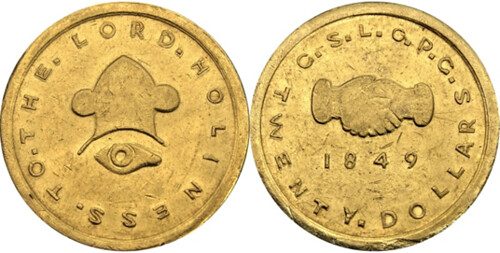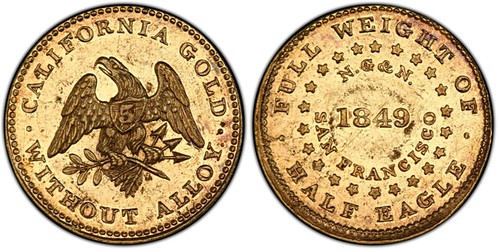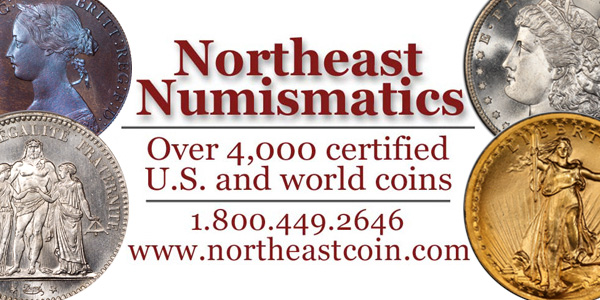
Douglas Nyholm published a nice article in the Utah Numismatic Society Mint Master for April 2022 about the first three coins made from California gold. With permission, we're republishing it here. Thanks!
-Editor
Unofficially the 1848 CAL Quarter Eagle gold coin was the first commemorative coin
issued by the U.S. Mint. Obviously this coin came about due to the discovery of gold in
California in 1848. On January 24, 1848 James Marshall, while working at Sutter's Mill
on the American River spotted gold flakes in the streambed. From there the rest is
history.
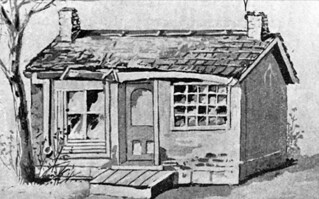 It was soon after that that the gold rush began and coinage was struck from California
gold. The Mormons were actually the first to strike a gold coin from California gold
which was brought back to Salt Lake City from returning Mormon Battalion members.
The first deposit of gold in Salt Lake City was on November 23, 1848 by Ebenezer
Brown, a Battalion member. It was on December 12, 1848 that the first $10 Mormon
gold coins were struck. These initial coins bore the date of 1849. This was less than a
year since the discovery at Sutter's Mill.
It was soon after that that the gold rush began and coinage was struck from California
gold. The Mormons were actually the first to strike a gold coin from California gold
which was brought back to Salt Lake City from returning Mormon Battalion members.
The first deposit of gold in Salt Lake City was on November 23, 1848 by Ebenezer
Brown, a Battalion member. It was on December 12, 1848 that the first $10 Mormon
gold coins were struck. These initial coins bore the date of 1849. This was less than a
year since the discovery at Sutter's Mill.
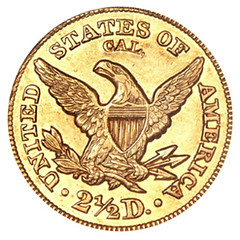 The next coin to be struck was the famous 1848 CAL Quarter Eagle struck a few days
later in December of 1848 with the counter-stamp CAL impressed on the reverse of the
coin. The exact date of its striking is not known but records note that some of these CAL
Quarter Eagles were available on January 5, 1849. The gold for these coins came from a
shipment of 228 ounces of California gold shipped by Col. R.B. Masson Jr. who at the
time was the acting Governor of California. The shipment left California on August 17th,
1848 and arrived in Philadelphia on December 8, 1848 which was confirmed by a letter
from the secretary of war, W.L. Marcy directed to mint director Patterson. As is the case
with raw gold bullion it was not ready for coining and had to be processed and coinage
most likely began soon after. Estimates of 1,389 pieces were struck from this gold. This
number is also an estimate based upon the weight of the original deposit.
The next coin to be struck was the famous 1848 CAL Quarter Eagle struck a few days
later in December of 1848 with the counter-stamp CAL impressed on the reverse of the
coin. The exact date of its striking is not known but records note that some of these CAL
Quarter Eagles were available on January 5, 1849. The gold for these coins came from a
shipment of 228 ounces of California gold shipped by Col. R.B. Masson Jr. who at the
time was the acting Governor of California. The shipment left California on August 17th,
1848 and arrived in Philadelphia on December 8, 1848 which was confirmed by a letter
from the secretary of war, W.L. Marcy directed to mint director Patterson. As is the case
with raw gold bullion it was not ready for coining and had to be processed and coinage
most likely began soon after. Estimates of 1,389 pieces were struck from this gold. This
number is also an estimate based upon the weight of the original deposit.
 The next interesting question was how were the letters CAL imparted into the coins
themselves? There are several theories, the most repeated one is that they were punched
into the coin while still in the die. This to me indicates it was accomplished before the
coin was ejected which doesn't seem possible. How could one set the punch then
hammer it while still in the press and die? Reading about multiple examples which have
been examined by experts, the CAL punch is virtually identical in position on all observed
coins. Also noted are several coins which show signs of double punching and was triple
punched. No coins show any flattening on the obverse lending credence to the other
theory that the punch was applied after the coin was struck but placed into a die with a jig
used to assure a standard position.
The next interesting question was how were the letters CAL imparted into the coins
themselves? There are several theories, the most repeated one is that they were punched
into the coin while still in the die. This to me indicates it was accomplished before the
coin was ejected which doesn't seem possible. How could one set the punch then
hammer it while still in the press and die? Reading about multiple examples which have
been examined by experts, the CAL punch is virtually identical in position on all observed
coins. Also noted are several coins which show signs of double punching and was triple
punched. No coins show any flattening on the obverse lending credence to the other
theory that the punch was applied after the coin was struck but placed into a die with a jig
used to assure a standard position.
There is no documentation that these CAL coins were ever sold at a premium but just
placed into circulation, or sold at face value to the few collectors at the time who had knowledge of their creation. Today it is estimated that about 200 survive and they are
actively collected by specialists. This coin is ranked as #70 in the current 5th edition of
the 100 Greatest U.S. Coins.
The third coin struck from California gold is that of the Norris, Gregg, & Norris, a $5
territorial coin. This coin preceded literally dozens of private mints which began
operation prior to both the U.S. Assay office and later the San Francisco mint. Again,
details are not known regarding the actual operation and initial striking but newspaper
reports told that they were available as early as May in 1849.
These three coins were the first to be struck from California gold. One other interesting
first is that of the first $20 denomination struck. This was also accomplished by the
Mormons with their $20 Coin struck on December 22, 1849. This preceded the U.S.
Mints striking of the first pattern 1849 Liberty Head Double Eagle by several days.
For more information on the Utah Numismatic Society, see:
https://www.facebook.com/UtahNumismaticSociety/
Wayne Homren, Editor
The Numismatic Bibliomania Society is a non-profit organization
promoting numismatic literature. See our web site at coinbooks.org.
To submit items for publication in The E-Sylum, write to the Editor
at this address: whomren@gmail.com
To subscribe go to: https://my.binhost.com/lists/listinfo/esylum
Copyright © 1998 - 2024 The Numismatic Bibliomania Society (NBS)
All Rights Reserved.
NBS Home Page
Contact the NBS webmaster
| 

